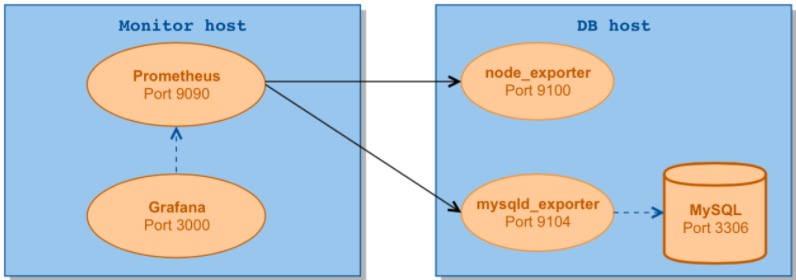Prometheus+Grafana监控
系统架构
系统: centos 7.9
配置: CPU 16核
网络:千兆网络
| 角色 | 主机名 | IP地址 |
|
Prometheus Grafana |
grafana | 10.121.118.50 |
| 监控客户端node-export | client01 | |
| 监控客户端node-export | client02 | |
| 监控客户端node-export | client03 |
一、介绍Prometheus
Prometheus(普罗米修斯)是一套开源的监控&报警&时间序列数据库的组合,起始是由SoundCloud公司开发的。随着发展,越来越多公司和组织接受采用Prometheus,社会也十分活跃,他们便将它独立成开源项目,并且有公司来运作。Google SRE的书内也曾提到跟他们BorgMon监控系统相似的实现是Prometheus。现在最常见的Kubernetes容器管理系统中,通常会搭配Prometheus进行监控。
Prometheus基本原理是通过HTTP协议周期性抓取被监控组件的状态,这样做的好处是任意组件只要提供HTTP接口就可以接入监控系统,不需要任何SDK或者其他的集成过程。这样做非常适合虚拟化环境比如VM或者Docker 。
Prometheus应该是为数不多的适合Docker、Mesos、Kubernetes环境的监控系统之一。
输出被监控组件信息的HTTP接口被叫做exporter 。目前互联网公司常用的组件大部分都有exporter可以直接使用,比如Varnish、Haproxy、Nginx、MySQL、Linux 系统信息 (包括磁盘、内存、CPU、网络等等),具体支持的源看:https://github.com/prometheus。
与其他监控系统相比,Prometheus的主要特点是:
- 一个多维数据模型(时间序列由指标名称定义和设置键/值尺寸)。
- 非常高效的存储,平均一个采样数据占~3.5bytes左右,320万的时间序列,每30秒采样,保持60天,消耗磁盘大概228G。
- 一种灵活的查询语言。
- 不依赖分布式存储,单个服务器节点。
- 时间集合通过HTTP上的PULL模型进行。
- 通过中间网关支持推送时间。
- 通过服务发现或静态配置发现目标。
- 多种模式的图形和仪表板支持。
二、Prometheus架构概览
该图说明了普罗米修斯(Prometheus)及其一些生态系统组件的整体架构:

它的服务过程是这样的Prometheus daemon负责定时去目标上抓取metrics(指标) 数据,每个抓取目标需要暴露一个http服务的接口给它定时抓取。
Prometheus
支持通过配置文件、文本文件、zookeeper、Consul、DNS SRV lookup等方式指定抓取目标。支持很多方式的图表可视化,例如十分精美的Grafana,自带的Promdash,以及自身提供的模版引擎等等,还提供HTTP API的查询方式,自定义所需要的输出。
Alertmanager
是独立于Prometheus的一个组件,可以支持Prometheus的查询语句,提供十分灵活的报警方式。
PushGateway
这个组件是支持Client主动推送metrics到PushGateway,而Prometheus只是定时去Gateway上抓取数据。
如果有使用过statsd的用户,则会觉得这十分相似,只是statsd是直接发送给服务器端,而Prometheus主要还是靠进程主动去抓取。
大多数Prometheus组件都是用Go编写的,它们可以轻松地构建和部署为静态二进制文件。访问prometheus.io以获取完整的文档,示例和指南。
三、Prometheus的数据模型
Prometheus从根本上所有的存储都是按时间序列去实现的,相同的metrics(指标名称) 和label(一个或多个标签) 组成一条时间序列,不同的label表示不同的时间序列。为了支持一些查询,有时还会临时产生一些时间序列存储。
metrics name&label指标名称和标签
每条时间序列是由唯一的”指标名称”和一组”标签(key=value)”的形式组成。
指标名称:一般是给监测对像起一名字,例如http_requests_total这样,它有一些命名规则,可以包字母数字_之类的的。通常是以应用名称开头_监测对像_数值类型_单位这样。例如:push_total、userlogin_mysql_duration_seconds、app_memory_usage_bytes。
标签:就是对一条时间序列不同维度的识别了,例如一个http请求用的是POST还是GET,它的endpoint是什么,这时候就要用标签去标记了。最终形成的标识便是这样了:http_requests_total{method=”POST”,endpoint=”/api/tracks”}。
记住,针对http_requests_total这个metrics name无论是增加标签还是删除标签都会形成一条新的时间序列。
查询语句就可以跟据上面标签的组合来查询聚合结果了。
如果以传统数据库的理解来看这条语句,则可以考虑http_requests_total是表名,标签是字段,而timestamp是主键,还有一个float64字段是值了。(Prometheus里面所有值都是按float64存储)。
四、Prometheus四种数据类型
Counter
Counter用于累计值,例如记录请求次数、任务完成数、错误发生次数。一直增加,不会减少。重启进程后,会被重置。
例如:http_response_total{method=”GET”,endpoint=”/api/tracks”} 100,10秒后抓取http_response_total{method=”GET”,endpoint=”/api/tracks”} 100。
Gauge
Gauge常规数值,例如 温度变化、内存使用变化。可变大,可变小。重启进程后,会被重置。
例如: memory_usage_bytes{host=”master-01″} 100 < 抓取值、memory_usage_bytes{host=”master-01″} 30、memory_usage_bytes{host=”master-01″} 50、memory_usage_bytes{host=”master-01″} 80 < 抓取值。
Histogram
Histogram(直方图)可以理解为柱状图的意思,常用于跟踪事件发生的规模,例如:请求耗时、响应大小。它特别之处是可以对记录的内容进行分组,提供count和sum全部值的功能。
例如:{小于10=5次,小于20=1次,小于30=2次},count=7次,sum=7次的求和值。
Summary
Summary和Histogram十分相似,常用于跟踪事件发生的规模,例如:请求耗时、响应大小。同样提供 count 和 sum 全部值的功能。
例如:count=7次,sum=7次的值求值。
它提供一个quantiles的功能,可以按%比划分跟踪的结果。例如:quantile取值0.95,表示取采样值里面的95%数据。
五、安装运行Prometheus(二进制版)
下面介绍如何使用Prometheus和Grafana对MySQL服务器性能进行监控。
我们用到了以下两个exporter:
- node_exporter – 用于机器系统数据收集
- mysqld_exporter – 用于MySQL服务器数据收集
Grafana是一个开源的功能丰富的数据可视化平台,通常用于时序数据的可视化。它内置了以下数据源的支持:
下面是我们安装时用到的架构图:
下载安装Prometheus(https://prometheus.io/download/)
[root@grafana]#wget https://github.com/prometheus/prometheus/releases/download/v1.6.2/prometheus-1.6.2.linux-amd64.tar.gz [root@grafana]#tar xvf prometheus-1.6.2.linux-amd64.tar.gz -C /usr/local/ [root@grafana]#ln -sv /usr/local/prometheus-1.6.2.linux-amd64/ /usr/local/prometheus [root@grafana]#cd /usr/local/prometheus
首先,修改Prometheus配置文件prometheus.yml (替换你要监控的IP地址):
[root@grafana ~]# cd /usr/local/prometheus-1.6.2/
[root@grafana prometheus-1.6.2]# cat prometheus.yml
global:
scrape_interval: 60s
evaluation_interval: 60s
scrape_configs:
- job_name: prometheus
static_configs:
- targets: ['localhost:9090']
labels:
instance: prometheus
#静态配置文件
- job_name: linux
static_configs:
- targets: ['client01:9100']
labels:
instance: myhosts
#动态的配置文件
- job_name: Development
file_sd_configs:
- files:
- targets/Development/*.yaml
refresh_interval: 5m
- job_name: Production
file_sd_configs:
- files:
- targets/Production/*.yaml
refresh_interval: 5m
启动Prometheus
[root@grafana prometheus-1.6.2]# ./prometheus -config.file=prometheus.yml
Prometheus内置了一个web界面,我们可通过http://10.121.118.50:9090进行访问:

在Status->Targets页面下,我们可以看到我们配置的两个Target,它们的State为DOWN。

下一步我们需要安装并运行exporter,下载exporters并解压到被监控端服务器:
wget https://github.com/prometheus/node_exporter/releases/download/v1.2.2/node_exporter-1.2.2.linux-amd64.tar.gz tar zxvf node_exporter-1.2.2.linux-amd64.tar.gz cd node_exporter-1.2.2.linux-amd64 ./node_exporter
六、安装运行Grafana
wget https://s3-us-west-2.amazonaws.com/grafana-releases/release/grafana-4.2.0-1.x86_64.rpm sudo yum localinstall grafana-4.2.0-1.x86_64.rpm
编辑配置文件/etc/grafana/grafana.ini,修改dashboards.json段落下两个参数的值:
[dashboards.json] enabled = true path = /var/lib/grafana/dashboards
安装仪表盘(Percona提供)
git clone https://github.com/percona/grafana-dashboards.git cp -r grafana-dashboards/dashboards /var/lib/grafana
运行以下命令为Grafana打个补丁,不然图表不能正常显示:
sed -i 's/expr=\(.\)\.replace(\(.\)\.expr,\(.\)\.scopedVars\(.*\)var \(.\)=\(.\)\.interval/expr=\1.replace(\2.expr,\3.scopedVars\4var \5=\1.replace(\6.interval, \3.scopedVars)/' /usr/share/grafana/public/app/plugins/datasource/prometheus/datasource.js
sed -i 's/,range_input/.replace(\/"{\/g,"\\"").replace(\/}"\/g,"\\""),range_input/; s/step_input:""/step_input:this.target.step/' /usr/share/grafana/public/app/plugins/datasource/prometheus/query_ctrl.js
最后我们运行Grafana服务
systemctl daemon-reload systemctl start grafana-server systemctl status grafana-server
我们可通过http://10.121.118.50:3000访问Grafana网页界面(缺省的帐号/密码为admin/admin):

然后我们到Data Sources页面添加数据源:

prometheus 监控的指标请参考以下的文档
https://www.kancloud.cn/pshizhsysu/prometheus/1804341
当前做了一些监控指标
统计在线主机数创建dashboard

sum(up ==1)
CPU 负载
Query:
node_load15
Legend format #显示主机hostname 通过 lable 的key 获取
{{instance}}
文件系统可用空间
Query:
node_filesystem_free_bytes{mountpoint="/"}
Legend format #显示主机hostname 通过 lable 的key 获取
{{instance}}




 浙公网安备 33010602011771号
浙公网安备 33010602011771号